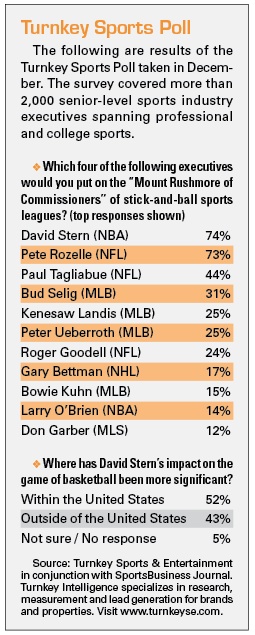Not long into NBC’s partnership with the NBA during the 1990s, Dick Ebersol quickly discovered that he wasn’t dealing with any ordinary executive in David Stern.
Ebersol, then chairman of NBC Sports, was overseeing NBC’s first NBA Finals in 1991, which featured a dream matchup between the Michael Jordan-led Chicago Bulls and Magic Johnson’s Los Angeles Lakers.
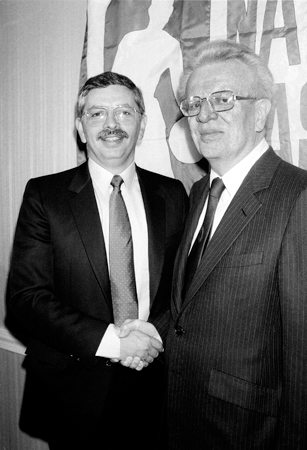 |
David Stern shakes hands with former NBA Commissioner Larry O’Brien in 1984.
Photo by: AP Images |
Before the network’s deal with the NBA from 1990 to 2002, the majority of the NBA’s Finals games were jammed into weekend daytime windows or, worse, on tape delay in the early 1980s. By 1989, some of the Finals games were being played in prime time, but Stern wanted more.
Ebersol figured he had a plan to satisfy the commissioner.
“After Game 1 on NBC in 1991, which was on a Sunday afternoon, which the Lakers won in Chicago, I called David and said, ‘Listen, I’ve been able to convince NBC to put the rest of the games in these Finals — all of them — on in prime time,’” Ebersol said. “The first words out of his mouth were, ‘That’s great.’ His second thing was, ‘You’re not thinking of doing this only once, are you?’”
A half-hour later, Ebersol got an answer.
“I talked to Bob Wright, who was running NBC at the time. He heartily concurred with me that we should do it. So I called [Stern] back, and he got it.
{podcast}
SBJ Podcast:
NBA writer John Lombardo and Executive Editor Abraham Madkour discuss David Stern's impact
on the NBA and what his future might hold.
“That’s the difference between a lot of people in the world who would have said, ‘Wow, that’s fantastic. We finally are going to have the whole Finals in prime time.’ Not with David.”
It is that vision, along with his razor sharp instincts and relentless management style, that allowed Stern over the course of his 30-year commissionership to take the league from a fringe sport in the early 1980s to the global property it is today.
Consider a meeting in the early 1990s between Stern, Portland Trail Blazers owner and Microsoft co-founder Paul Allen, and then-NBA marketing executive Rick Welts.
Allen went to brief Stern about his plans to use an emerging technology called the Internet to help market the Blazers. Stern figured it might be worth listening to the guy who helped invent operating systems for personal computers.
“We sat in a conference room and none of us had a computer on our desks,” said Welts, who is now president and COO of the Golden State Warriors. “Paul told us he was going to have this thing called a website for the Blazers while explaining that it would be a big deal.”
After listening to the presentation, Stern stopped Allen in his tracks at the idea of NBA teams having independent Internet operations. A better idea, Stern insisted, was to centralize the league’s yet-undeveloped digital business.
“David said, ‘No, you are not going to do that,’” Welts said. “Here is the guy who invented the computer and David is telling him what he isn’t going to do. At the time, David wasn’t at the cutting edge of the user experience but somehow he had this crazy ability to see the long-term impact of innovation.”
But to Stern, execution and a zealous devotion to detail were just as vital as his vision in running the NBA.
“For me personally, he taught me to always look at the big picture and see where the world is going and define creative ways to meet rather than change it,” said NBA Deputy Commissioner Adam Silver, who takes over for Stern in February. “At the same time, he also taught that it’s not enough to just have a bold vision. You need a constant focus on so-called execution and detail to realize that vision.”
Changing the image
When Stern was named commissioner in 1984 at the age of 41, the league counted some 60 employees and $165 million in revenue. Each of the 23 NBA teams at the time operated mostly as entities unto themselves. The NBA’s average television deal was worth a paltry $28 million annually, and leaguewide marketing and branding was a foreign concept.
The NBA this year expects $5.5 billion in annual revenue, and one of the league’s small-market teams, the
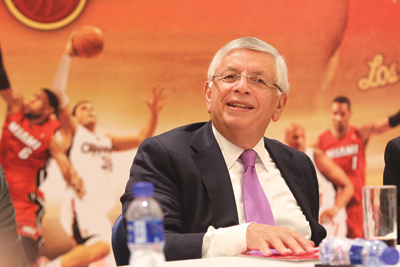 |
Stern increased the NBA’s business through media deals, marketing strategies, franchise expansion and international growth.
Photo by: AP Images |
Sacramento Kings, recently sold for more than $500 million.
“When I got into the league, our central revenues outside of ticket sales were less than $1 million,” said Chicago Bulls Chairman Jerry Reinsdorf, who bought the Bulls in 1985 for $16 million. “David took basketball from a sport that had its Finals on tape-delay television to a worldwide sport. There was no marketing when I got into the league.
He was determined to bring what was a second-class sport into a world-class sport. You have to give him the majority share of the credit.”
Those early years under Stern were a battle as the league struggled to counter the negative image of NBA players.
“The biggest hurdle was the issue of player image because it covered the issue of race and how young athletes were perceived,” former NBA Deputy Commissioner Russ Granik said. “In the late ’70s and early ’80s, you had football and baseball, and the NBA wanted the respect as a mainstream sport. That is what had to be built over the years.”
As executive vice president for the NBA before being hired as commissioner, Stern was no stranger to tackling the league’s problems. A seminal moment came early in his tenure in 1984, the first year of a new collective-bargaining agreement that included the NBA’s first salary cap and a drug-testing system.
“David knew what the perception was and in order to make it attractive to corporate America, he got a drug policy, the salary cap, and he promoted players like Magic Johnson and Julius Erving as individual players and as the best athletes in the world,” said Steve Mills, who spent 16 years working for Stern at the NBA and is now president and general manager of the New York Knicks. “The players became the biggest assets the league had.”
Stern and his cadre of young workaholic lawyers, including Granik and Gary Bettman, a fellow deputy commissioner at the time who would go on to become NHL commissioner, spent the mid-1980s dispelling the negative image, an effort no doubt aided by the 1984 NBA draft class, which included future Hall of Fame players Michael Jordan, Charles Barkley, Hakeem Olajuwon and John Stockton.
Always among the smartest executives in the room, Stern pushed the NBA into new media deals, created new licensing and marketing strategies, negotiated new labor contracts, led franchise expansion, and broke ground for international growth, all the while creating a new job description for a modern-day big league commissioner.
“David had to, and was able to, deal with the complexities of antitrust laws, labor laws, media rights, being the first league to have a drug agreement, and of marketing a sport with a brand that at the time he came on was perceived as being difficult to take to mainstream America,” said Bettman, who before joining the NHL spent 12 years working with Stern at the NBA. “He helped create a licensed product business before there was much of one. He brought all that together and he was the first to do that whole package. So I would say that David is the whole package and that is what a commissioner in this time had to become, particularly in this era of expansion internationally and onto digital media platforms — both of which didn’t even exist when he came in.”
Stern’s rule
The NBA flow chart may read that the office of the commissioner reports to team owners, but the reverse was reality as owners walked mostly in lockstep with Stern’s directives during his 30 years on the job.
“From a fun standpoint, I much prefer baseball where the owners can participate in the governance of the game,”
Reinsdorf said. “In basketball, we haven’t been able to, but David has done a fabulous job so what do I have to complain about?”
So strong was Stern’s leadership that rarely did owners contest any of his initiatives.
“To watch him in an owners meeting, he’d have a great way of always getting you to look for the big picture,” said former Cleveland Cavaliers owner Gordon Gund. “But he could also get down and wrestle with us over the issues.”
Owners meetings may have been meant for debate and discussion, but much of the decision making was left to Stern.
“I went to every board meeting for five years and it was just amazing to me,” said Pat Croce, former co-owner of the Philadelphia 76ers. “We’d get the agenda, but whatever David wanted to get done, got done. He really cares about fans, too, and will get really radical with owners when he thinks the fans are getting shafted.”
From the hard-fought labor battles that brought lockout-shortened seasons to being among the first to see the rise of cable television to creating a separate business entity in China, Stern developed unprecedented power among the league’s ownership.
“He ruled by consensus but he always made sure he had a consensus,” said Micky Arison, owner of the Miami Heat. “Clearly he was very much a leader and not a follower of the 30 owners.”
The ability to lead was tested during some of the NBA’s darkest days, including the infamous 2004 “Malice at the Palace” melee that saw Indiana Pacers and Detroit Pistons players jump into the stands to fight with one another and
with fans.
Stern levied unprecedented punishments that cost the players involved $11 million in lost salary. Stern and Pacers owner Herb Simon clashed over the league’s response, but as usual, Stern prevailed.
Simon, nearly a decade later, sees the value of Stern’s leadership.
“David didn’t care about our friendship,” Simon said. “He put the league first and that is why it has prospered. In the long run, he’s been right on everything he’s done.”
But along with the success were controversies and criticism that challenged Stern throughout his tenure.
There was the NBA’s first draft lottery in 1985, which brought out the conspiracy theorists claiming that the fix was in to get the big-market New York Knicks the first draft pick, Patrick Ewing. There was Magic Johnson and his stunning HIV announcement, then the Pistons brawl, followed by the gambling scandal involving referee Tim Donaghy. Stern also enforced a player dress code seen by some as heavy-handed, and he implemented an age limit for NBA prospects.
When the league owned the New Orleans Hornets from 2010 to ’12, Stern blocked a trade to send Chris Paul to the Los Angeles Lakers, a move that brought a raft of criticism. And Stern’s pet project in the WNBA still struggles for profitability.
“We can make a list of all the things he had to deal with, and these were not easy things,” said Jerry Colangelo, chairman of USA Basketball and former owner of the Phoenix Suns. “Yet I think he showed great compassion. There is also not enough said about his love for the game.”
Stern, well-versed in crisis management, rarely shielded himself from the issues.
“He never hid during a crisis,” said Terry Lyons, a former senior NBA executive. “It was always, ‘Deal with it, tell the truth and move on.’ That was in his DNA. He always said to us, ‘You’d better answer the phone when there’s a problem, if you want them to pick up the phone when things are good.’”
Stern also solidified his standing with owners during the NBA’s series of labor battles and lockouts.
“David fought during the negotiations to create a contractual situation that allowed small markets to compete,” said Peter Holt, owner of the San Antonio Spurs, chairman of the NBA board of governors, and chairman of the league’s labor committee during the last collective-bargaining agreement negotiations.
Those on the other side of the negotiating table from the commissioner call Stern as skilled a deal-maker as there is in sports.
“As the first league to have the cap, he has really been at the forefront of changing the economics of pro sports,” said Arn Tellem, vice chairman of Wasserman Media Group and one of the most powerful agents in the industry.
“He has a great ability to see any issue from both sides. Having empathy is an important skill in any negotiation, and even though he could disagree, one of his greatest strengths was to see it from the other person’s perspective — not to say he wasn’t strong-willed, but he could always grasp the other side of any argument — that is an essential skill for any deal-maker, and David is one of the best. Take all the other commissioners combined and I don’t think they equal his impact.”
Media mogul
As much as Stern pushed through his labor strategy, he also demanded and cajoled the networks and corporate sponsors to work together to help build the NBA.
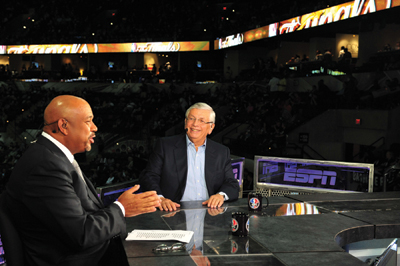 |
The commissioner worked to align the interests of networks and corporate sponsors.
Photo by: NBAE / Getty Images |
“He’d sit in on a meeting and we’d hear of different ways of doing a deal and being creative so that everything wasn’t cookie cutter,” said Tony Ponturo, former head of sports marketing for Anheuser-Busch.
Bluster and calculated intimidation were part of the delivery. Stern could be irascible with both the media and league partners, but there also was a willingness to listen to other ideas.
“He could have run any business, and he’s one of the few people in sports I would say that about,” said Paul Fireman, Reebok founder. “He may have been tough at times, but he was fair, and he supported his people and got great results out of them.”
The message was that the NBA was a league that could be a valuable partner, aligning the interests of both networks and sponsors.
“Throughout his tenure, David recognized the power of media, embracing change and in turn greatly expanding the visibility of the sport and its stars,” said ESPN President John Skipper. “He leaves with his NBA flourishing and positioned for a fabulous future.”
Stern was one of the first commissioners to migrate the NBA to cable television while advancing opportunities in the field of digital media. He created NBA.com in 1995, the first league to integrate both team and league websites. The NBA then launched NBA TV in 1999 (then called NBA.com TV), and the league has long embraced various social media channels to drive its brand.
“It was David’s vision and his smart, forward thinking that really put Turner on the map,” said David Levy, president of Turner Sports. “He was the only commissioner at the time to look at cable and Turner/ESPN as an option. He put his crown jewels on cable well before any of the other top leagues. He trusted us with the postseason. He trusted us with the All-Star Game. He trusted us with his brand at NBA TV and NBA Digital. These moves were both risky and visionary at the same time.”
Lasting legacy
Stern, who declined to be interviewed for this story, has no interest in discussing his legacy, preferring to leave it to others to offer perspective on his 30-year run with the NBA.
Some insist that it’s the globalization of the NBA under Stern that truly defines his tenure.
“David inherited a product that was burdened with a lot of issues, and he created a global marketing business and,
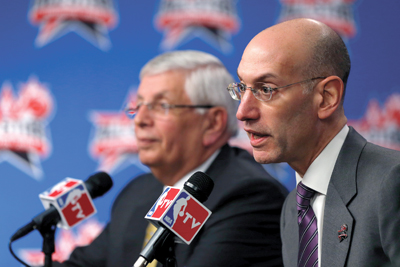 |
As Stern prepares to step aside, the focus shifts to Adam Silver, who will succeed him as commissioner.
Photo by: Getty Images |
perhaps, the most global sport and the most international league,” said Mark Lazarus, chairman of NBC Sports Group. “It’s something that fans and marketers could aspire to be part of.”
Come February, Stern’s carefully crafted and model succession plan guarantees a smooth transition, exemplified by the almost immediate and unanimous vote among owners elevating Silver to league commissioner.
“David’s legacy is twofold. One, he’s leaving the NBA as strong as it has ever been,” said Randy Freer, president and chief operating officer of Fox Networks Group. “The business is in great shape here in the U.S., and it’s well-positioned to continue to grow internationally. And two, David has become the role model for the modern sports commissioner — forward-thinking, globally minded, and media savvy.”
Others put Stern’s legacy beyond the NBA as he fought to bring the league recognition and respect outside the industry.
“He elevated the NBA and its brand into mainstream America,” Colangelo said. “He has rubbed shoulders with the Goliaths of the business world and with world leaders. Therefore, the NBA has received great benefits through his relationships with corporate leaders and political leaders across the board.”
Silver, who for 20 years has had a front-row seat serving as an apprentice to Stern, sees the impact his boss has had outside of sports.
“David has not only been one of the great commissioners of all time, but by any measure, he is one of the top CEOs in modern business history,” Silver said. “He has also shown us that the NBA is about more than basketball and that NBA players and fans are a reflection of a rapidly changing America and an increasingly shrinking and interconnected world. He always wanted to make sure we had a seat at the table on all matters related to sports and society.”
Staff writers Terry Lefton and John Ourand contributed to this report.




